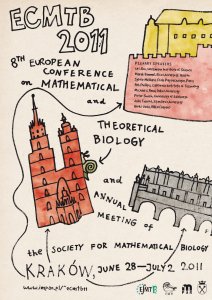Outline
The ECMTB mentoring scheme aims to improve the educational and professional experience of scientists at the conference by introducing junior and senior scientists with similar research interests. The mentor can help mentees in many different ways: by discussing research, career paths, research in different countries or industries, introducing them to other researchers in the area or simply by buying them a beer.How does it work?
Anyone attending ECMTB 2011 can join the scheme via the conference registration form or by contacting the coordinator (see below). You can be a mentor, mentee or both. Mentees are generally junior scientists and include students, postdoctoral fellows, research assistants, and junior faculty. Mentors are generally senior scientists and include postdocs, lecturers and faculty members, but the definitions are flexible. Mentors and mentees are introduced before the conference via email and they arrange to meet during the conference, for instance during the coffee breaks. There will be a designated mentor meeting place at the conference site and a social trip during the conference.How do I sign up?
Please click Register as mentee or mentoror email the Mentor Scheme Coordinator - Ellen Brooks Pollock with some of the following information:
Name
Whether you would like to be a mentee, mentor or both
Brief description of research interests, including which of the conference key topics you are most interested in
The country, language and industry you work or are interested in working in
Mentees: Any requests for mentors?
Mentors: Any special expertise that may be of benefit to mentees.
Introductory lectures
A series of introductory lectures dedicated to young participants is planned. The lectures will be held a day before the Conference start - on Monday, 27-th June - in the afternoon. The event will take place at the New Campus of the Jagiellonian University.Lecturers:
- Stanisław Cebrat
- Andreas Deutsch
- Peter Jagers
- Eva Kisdi
- Andrea Pugliese





